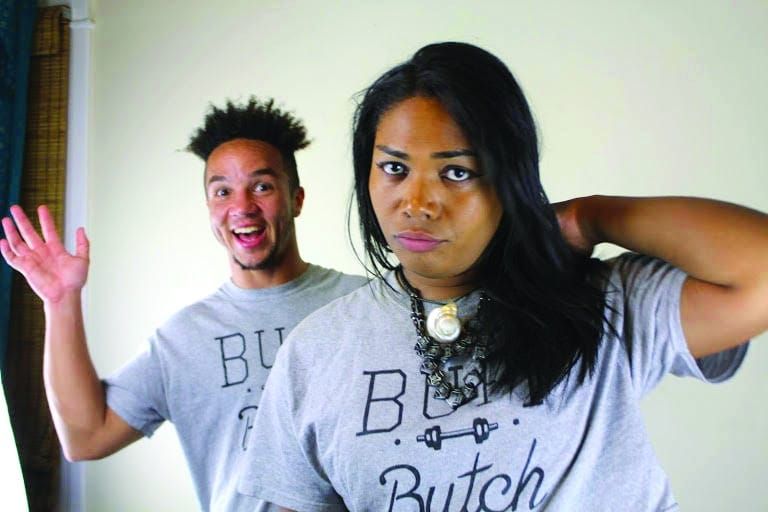In the spirit of Transgender Awareness Month, several UMKC groups came together to sponsor workshops presented by Buff Butch (buffbutch.com), a fitness resource for queer, transgender and gender-nonconforming people.
Two workshops – “QPOC (queer people of color) Fitness as Self Care” and “Fitness to Heal Trauma: Mind-Body Integration” – took place Nov. 15, cosponsored by UMKC’s Pride Alliance, LGBTQIA Programs & Services, Title IX Office and the Student Activity Fee Committee. Buff Butch collaborators Pat Manuel and Edxie Betts presented the workshops.
Buff Butch uses trauma-informed fitness training and education to empower survivors of hate and sexual violence, women, LGBTQ people, communities of color, people with disabilities and other oppressed or marginalized persons.
The presenters
Patricio “Pat” Manuel is a transgender male of color. He was the first out queer boxer at a women’s Olympic trial, a five-time female amateur champion and the first U.S.A. Boxing-sanctioned amateur fighter to compete as both male and female.
As a 16-year-old with gender dysphoria, he enjoyed Street Fighter and Japanese movies. Puberty sent him into a state of dissociation, and his grandmother took him to a boxing club. He found that boxing grounded him, allowing him to become present, and he began caring about school. During gender transition, he realized that he had unhealed trauma that he needed to confront.
Edxie Betts is a cultural worker, artist and activist. She began participating in direct action work in Louisville, Kentucky, escorting women into abortion clinics. She moved to Los Angeles in 2010 and became involved with social movements such as Trans Liberation, Occupy and Black Lives Matter. Understanding that suffering and structural isolation lead to excellence in art, she believes that everyone can be creative and organize to change society.
She works with many projects in the Los Angeles area, such as Queer Resistance, Los Angeles Liberation School, the Unstoppable Project and the Trans Life and Liberation Art Series.
Workshops
The “QPOC Fitness as Self Care” workshop was exclusively for those who identify as queer people of color. Some highlights of the “Fitness to Heal Trauma: Mind-Body Integration” session follow.
The workshop took place one week after the presidential election, a contest where the victor had used xenophobia as a tool. Many in the room were still figuring out how to deal with a new administration that could potentially target them as “other.” Relieving this kind of stress or even larger trauma was the goal of the workshop.
Manuel asked attendees how they dealt with threats, both verbal and physical. Betts explained how sometimes widely accepted trans-misogyny mitigates her response to threats.
“What if the threat never ended?” For example, what if an abuser were placed into a power position like your boss or the president of the United States? Affirming an abuser can perpetuate trauma. Inter-generational abuse and relentless media imagery can do this, as well.
Non-physical threats may include emotional, mental. spiritual and societal components. Levels of trauma run from individual up to global and environmental. Everyone has some sort of trauma, even the privileged. How can we heal when we are constantly harmed?
● By undoing the immediate cause of trauma itself.
● By undoing entitlement and privilege that keep abusers in power positions.
Side-effects of ongoing trauma include the dangers of mind-body disconnection, the presenters told attendees.
In the late 1990s, Kaiser Permanente and the Centers for Disease Control and Prevention (CDC) conducted the Adverse Childhood Experiences (ACE) Study. The study and its follow-up studies helped teach health-care practitioners about trauma and trauma-informed care. A trauma-informed approach has since been adopted by many disciplines.
Manuel spoke about neuroplasticity and the brain’s potential to heal itself under positive stimulation (if they fire together, they wire together).
Attendees were asked what fitness methods might be used to heal trauma and repair the brain. Meditation and yoga were cited. Manuel noted that there are many different ways toward mind-body reconnection, in addition to borrowing Eastern practices.
He brought up his own area of interest, boxing, saying that it allows for strength training while replicating the violence (in a healthful manner) that may have been done to a victim. This reversal of roles gives one agency to fight back in an oppressive society.
Exercise can also disperse stress hormones. The archetypal exercises of the fitness industry may not work for everyone. Use what’s best for you. Realizing that training shouldn’t be about aesthetic but about performance can help one work toward potential rather than collapsing in immediate failure.
Trauma-informed fitness can help move a person from stabilization to coordination and then to mobility and strength. One source of trauma-informed fitness might be local transgender-inclusive gyms or fitness studios. As the Buff Butch website says, “The fitness industry is rife with body shaming, racism, enforcement of gender binaries, ableism and a lack of representation by queer folks.”
For more information on Buff Butch, check out these links.
Web
Buff Butch website: buffbutch.com
Facebook page: facebook.com/bbutchLGBTQ
YouTube page: youtube.com/TheBuffButch
Holiday Survival Checklist - buffbutchholidays.pagedemo.co
